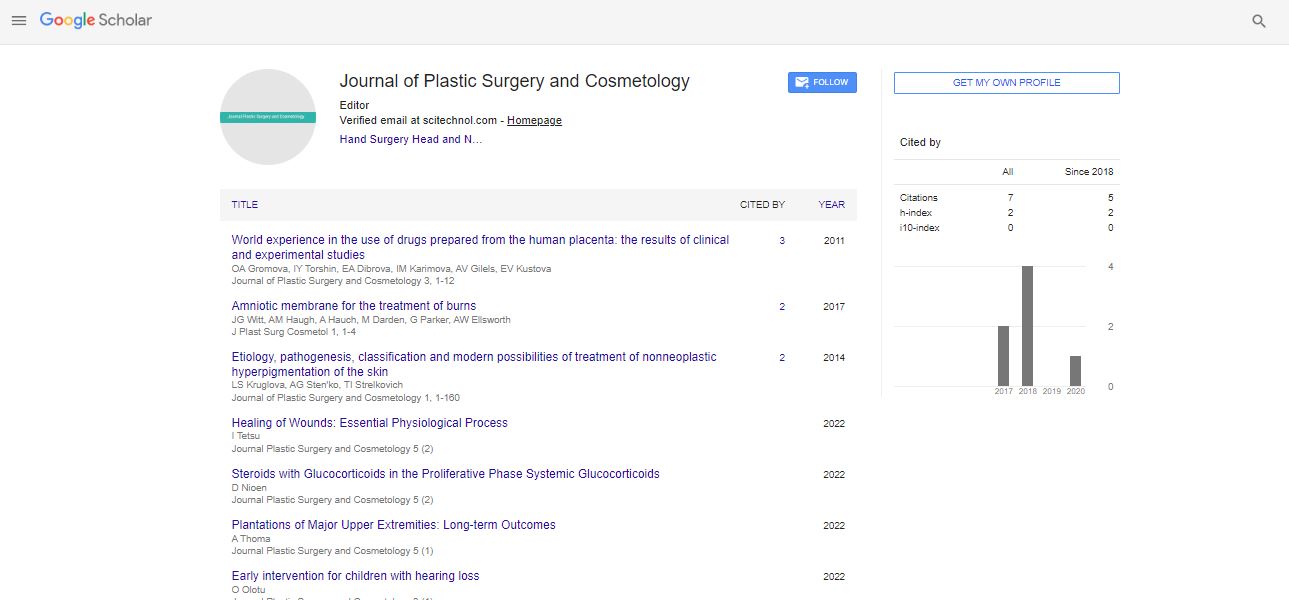Commentary, J Pls Sur Cos Vol: 12 Issue: 1
An Overview on Hepatacellular Carcinoma and its Treatment Methods
Xinyu Zhao*
Department of Clinical Laboratory Center, Shaoxing People’s Hospital, Shaoxing, China
*Corresponding Author: Xinyu Zhao
Department of Clinical Laboratory
Center, Shaoxing People’s Hospital, Shaoxing, China
E-mail: zhaoxin0575yu@163.com
Received date: 03 February, 2023, Manuscript No. JPSC-23-95386;
Editor assigned date: 06 February, 2023, PreQC No. JPSC-23-95386 (PQ);
Reviewed date: 20 February, 2023, QC No JPSC-23-95386;
Revised date: 27 February, 2023, Manuscript No. JPSC-23-95386 (R);
Published date: 07 March, 2023 DOI: 10.4172/JPSC.100042.
Citation: Zhao X (2023) An Overview on Hepatacellular Carcinoma and its Treatment Methods. J Pls Sur Cos 12:1.
Keywords: Aesthetic Surgery, Breast Augmentation, Breast Reconstruction
Description
Hepatocellular Carcinoma (HCC) is the most common type of primary liver cancer, accounting for approximately 90% of all cases. The disease is characterized by the uncontrolled growth and proliferation of hepatocytes, the primary cells that make up the liver. HCC is a serious health concern, with an estimated 841,000 new cases diagnosed globally each year and a mortality rate that exceeds 600,000 individuals annually.
There are several known risk factors associated with HCC. Chronic infection with the Hepatitis B Virus (HBV) or Hepatitis C Virus (HCV) is the most significant risk factor for HCC development, accounting for approximately 80% of all cases. Individuals with chronic liver disease or cirrhosis, caused by long-term alcohol abuse, Non-Alcoholic Fatty Liver Disease (NAFLD), or other factors, are also at increased risk of developing HCC.
Other risk factors include exposure to aflatoxin, a toxin produced by the fungus Aspergillus that can contaminate food products, as well as inherited conditions such as hemochromatosis, a disorder that causes excess iron to accumulate in the liver.
The symptoms of HCC can vary depending on the stage of the disease. Early-stage HCC may not cause any noticeable symptoms, and the disease may only be detected through routine screening tests.As the cancer progresses, symptoms may include abdominal pain, swelling, or tenderness, unexplained weight loss, nausea or vomiting, and jaundice, a condition that causes yellowing of the skin and eyes. The diagnosis of HCC typically involves a combination of imaging tests and blood tests. Imaging tests such as ultrasound, Computed Tomography (CT), or Magnetic Resonance Imaging (MRI) may be used to visualize the liver and identify any abnormalities. Blood tests may be used to measure levels of certain liver enzymes, such as Alpha-Fetoprotein (AFP), which can be elevated in individuals with HCC. If imaging tests or blood tests suggest the presence of HCC, a biopsy may be performed to confirm the diagnosis. During a biopsy, a small sample of liver tissue is removed and examined under a microscope to determine if cancerous cells are present.
The treatment of HCC depends on several factors, including the stage of the disease, the individual’s overall health, and the presence of any underlying liver disease or other medical conditions. Treatment options may include surgery, radiation therapy, chemotherapy, or a combination of these approaches.
Surgery is often the preferred treatment for early-stage HCC. The most common surgical procedure is a partial hepatectomy, in which a portion of the liver containing the cancerous tumor is removed. In some cases, a liver transplant may be recommended, particularly for individuals with advanced liver disease or cirrhosis.
Radiation therapy uses high-energy radiation to destroy cancer cells. This approach may be used alone or in combination with other treatments, such as surgery or chemotherapy. Chemotherapy uses drugs to destroy cancer cells. Chemotherapy may be administered orally, through injection, or directly into the liver through a catheter.
In some cases, a combination of treatments may be used to achieve the best possible outcome. For example, individuals with advanced HCC may receive a combination of chemotherapy and radiation therapy, or a liver transplant followed by chemotherapy or radiation therapy.
The prognosis for individuals with HCC depends on several factors, including the stage of the disease at diagnosis, the individual’s overall health, and the effectiveness of treatment. In general, the earlier the cancer is detected and treated, the better the prognosis.
 Spanish
Spanish  Chinese
Chinese  Russian
Russian  German
German  French
French  Japanese
Japanese  Portuguese
Portuguese  Hindi
Hindi 